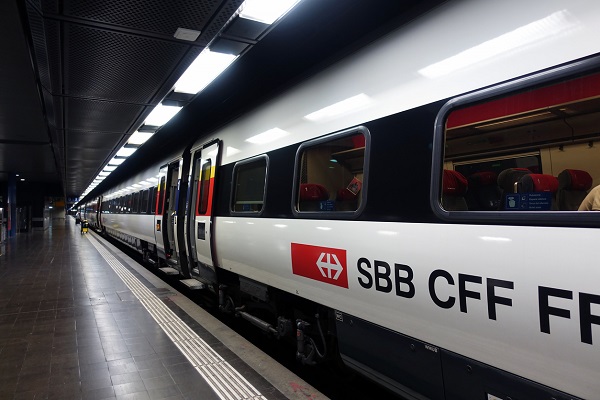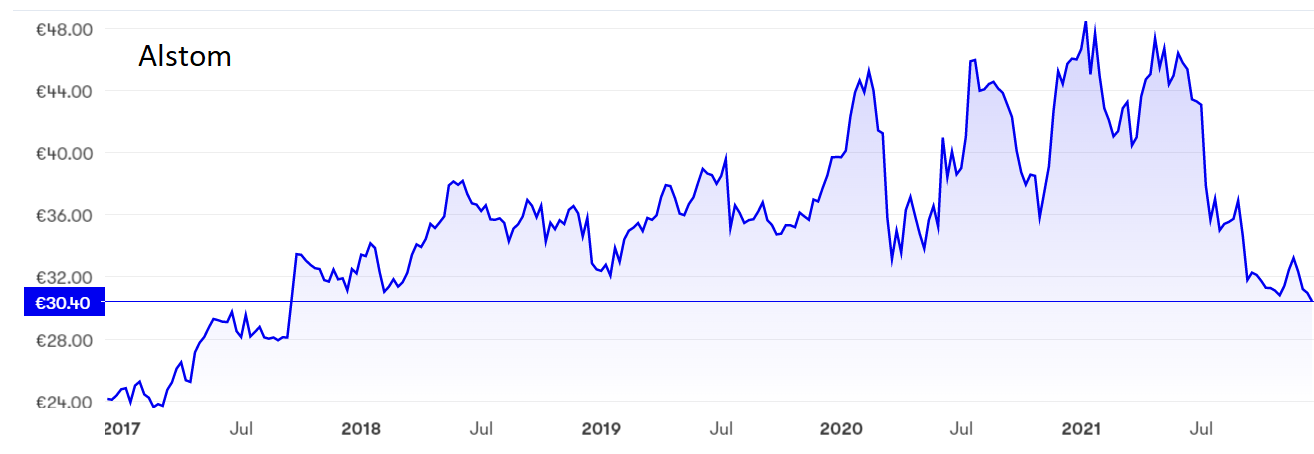Recovery opportunity spotted at this French multinational
15th December 2021 09:20
by Rodney Hobson from interactive investor
Backing this industry giant proved premature, but the investment case is still sound and our overseas investing expert remains optimistic.

Rodney Hobson is an experienced financial writer and commentator who has held senior editorial positions on publications and websites in the UK and Asia, including Business News Editor on The Times and Editor of Shares magazine. He speaks at investment shows, including the London Investor Show, and on cruise ships. His investment books include Shares Made Simple, the best-selling beginner's guide to the stock market. He is qualified as a representative under the Financial Services Act.
One of this year’s big investment disappointments has been French railways equipment group Alstom SA (EURONEXT:ALO). Despite the company winning more contracts around the world and producing results in line with guidance, the shares are bumping down against a four-year low.
Alstom bought Canadian rival Bombardier in January and there are some concerns that it has bitten off more than it can chew. However, the acquisition has opened up new markets in North America and Asia that allow Alstom to expand out of its European comfort zone. The €5.5 billion deal transforms the group into the second largest in the sector after China’s CRRC.
- The world’s 10 biggest dividend payers in the second quarter of 2021
- Bill Ackman: hot sectors and the economy in 2022
- Want to buy and sell international shares? It’s easy to do. Here’s how
- Friends & Family: ii customers can give up to 5 people a free subscription to ii, for just £5 a month extra. Learn more
First-half results to the end of September did contain the indisputably disappointing news that net profits slipped 2.3% to €168 million. However, underlying profits, stripping out one-off integration costs, were fractionally higher and the situation should improve as the world slowly gets back to something resembling normal.
Sales were up 14% at €7.4 billion as the group bounced back from lockdowns across all regions and product lines. Although Alstom is best known for manufacturing rolling stock, it also provides signalling and maintenance.

Source: interactive investor. Past performance is no guide to future performance
Alstom booked €9.7 billion of new orders in the six months, an 81% rise on the previous year when the pandemic caused a serious slump in railway investment around the globe. Most orders, €6.3 billion worth, came in Europe but there is plenty of scope elsewhere in the world if the Bombardier acquisition comes good.
Meanwhile, the backlog of orders waiting to be fulfilled stood at €76.36 billion, giving strong visibility of earnings for the rest of this financial year and beyond.
Alstom is assuming no further disruptions to the world economy, which may prove to be on the optimistic side. It also issued a reassurance that it did not expect significant supply chain shortages, which is a little more believable as that is more within the company’s control.
Much depends on how well Alstom handles the completion of some problematic projects inherited from Bombardier. These will cause significant cash outflows over the current financial year but the €1.46 billion drain in the first half was not as bad as analysts expected. In any case, Alstom has the resources to handle this outflow, with €1.14 billion of cash plus €3.25 billion in undrawn revolving credit facilities.
Chief executive Henri Poupart-Lafarge said that the integration of the rail business and stabilisation of the legacy projects was "fully on track", and that Alstom would start to generate cash later in the second half even though clearing all the outstanding lossmaking contracts, amounting to €1.3 billion, will take two to three years.
The future of Alstom could depend on how it develops its green credentials. Helping to improve public transport already gives a head start, but the company is now developing hydrogen-powered trains that have already clocked up 200,000 miles. Alstom has the lead in this field. It is also developing efficient railway systems that can reduce energy consumption by 20-30%.
Another important strand for the future is the development, in conjunction with Airbus SE (EURONEXT:AIR), of cybersecurity systems for rail operators.
- Why I’m buying ‘value’ stocks and other top tips
- Ian Heslop's outlook for the US stock market in 2022
- Take control of your retirement planning with our award-winning, low-cost Self-Invested Personal Pension (SIPP)
Alstom has been a poor, even non-existent, dividend payer in the past but is now talking about paying out 25-35% of profits. That should help the shares, which are back down to €30 after peaking at €48 in January.
Hobson’s choice: I tipped Alstom shares at €46 in May, feeling that the fallback in the price had opened up a buying opportunity. That proved to be wildly premature, although I was by no means alone in that judgement. It is dangerous to try to catch falling knives but I still believe that the shares will bounce back and still rate them a buy.
Rodney Hobson is a freelance contributor and not a direct employee of interactive investor.
These articles are provided for information purposes only. Occasionally, an opinion about whether to buy or sell a specific investment may be provided by third parties. The content is not intended to be a personal recommendation to buy or sell any financial instrument or product, or to adopt any investment strategy as it is not provided based on an assessment of your investing knowledge and experience, your financial situation or your investment objectives. The value of your investments, and the income derived from them, may go down as well as up. You may not get back all the money that you invest. The investments referred to in this article may not be suitable for all investors, and if in doubt, an investor should seek advice from a qualified investment adviser.
Full performance can be found on the company or index summary page on the interactive investor website. Simply click on the company's or index name highlighted in the article.
Disclosure
We use a combination of fundamental and technical analysis in forming our view as to the valuation and prospects of an investment. Where relevant we have set out those particular matters we think are important in the above article, but further detail can be found here.
Please note that our article on this investment should not be considered to be a regular publication.
Details of all recommendations issued by ii during the previous 12-month period can be found here.
ii adheres to a strict code of conduct. Contributors may hold shares or have other interests in companies included in these portfolios, which could create a conflict of interests. Contributors intending to write about any financial instruments in which they have an interest are required to disclose such interest to ii and in the article itself. ii will at all times consider whether such interest impairs the objectivity of the recommendation.
In addition, individuals involved in the production of investment articles are subject to a personal account dealing restriction, which prevents them from placing a transaction in the specified instrument(s) for a period before and for five working days after such publication. This is to avoid personal interests conflicting with the interests of the recipients of those investment articles.